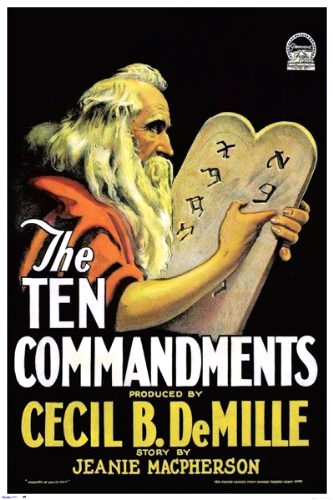 Poster art for the 1923 film, “The Ten Commandments.” Courtesy of IMDb
Poster art for the 1923 film, “The Ten Commandments.” Courtesy of IMDb File this under good news for those that support the democratization of art, enjoy free stuff and are looking for something to distract them from carbohydrate-withdrawals this Passover.
After nearly a century of wandering in the desert of copyright restriction, Cecile B. DeMille’s 1923 silent Biblical epic film, “The Ten Commandments,” has reached the promised land of pubic domain.
The copyright on the film expired on Jan. 1. 2019, following 96 years since its original release date by Paramount. What does this mean exactly? Well, for one Reddit user who uploaded the entire film on YouTube the day it entered the public domain and subsequently received a notification that the film was taken down following a copyright claim by Paramount, it meant a David-like victory over Goliath.
The crusading Reddit user contested the claim by pointing out that the film now officially belonged to the public. Paramount apparently backed down because YouTube allowed the user to upload the film, which can now be viewed online in its entirety in time for Passover.
The film was a blockbuster of its time. According to a 1959 Montreal Gazette obituary of DeMille, DeMille spent more than $1 million on the 1923 Paramount production and was the first Hollywood producer to spend that much on a film. The gamble paid off. The box-office “returns from the $1.5 million Biblical film held the Paramount revenue record for 25 years—to be broken, eventually, by other DeMille productions.”
It is easy to see why audiences ate up this two-part mammoth work like manna. The Exodus story makes up the prologue of the film. In the opening sequence, there are massive sets depicting ancient Egypt, with a large cast of extras portraying Hebrew slaves undergoing the backbreaking work of constructing the ancient Egyptian empire.
The Red Sea sequence some time later begins with the Hebrews crossing the Red Sea and ends with two walls of waves crashing down on the charging chariots of regretful Egyptians. The special effects are way ahead of their time.
This prologue concludes with Moses receiving the Ten Commandments, which is also a visual feast. Upon seeing that the Hebrews have built a Golden Calf in his absence, Moses smashes the tablets. Watching this scene, one sees how this film was a precursor to DeMille’s better-known 1956 film of the same name starring Charlton Heston.
While the first 48-minutes of the film retells the familiar Exodus story, with words lifted right out of the Bible narrating the silent, organ-heavy film, the second half of the film is set in San Francisco, “showing the efficacy of the commandments in modern life,” IMDb says.
Actor Theodore Roberts, a veteran stage actor and the son of a sea captain who appeared in 23 of Demille’s films, according to IMDb, plays Moses in the film.
DeMille’s visionary film was under copyright protection for so long due to this country’s restrictive copyright law. The release of works published in 1923 into the public domain this year marked the first time since 1999 that the copyright protection on U.S. works has expired, following repeated extensions on the duration of copyright in this country. From here on out, works will be released ever year on Jan. 1, which is officially known as Public Domain Day. (For more on copyright law as it pertains to this film and other works, read Duke University School of Law’s article on the subject.)
As a tagline for Public Domain Day, how does “Let My Copyright Go!” sound?





















 More news and opinions than at a Shabbat dinner, right in your inbox.
More news and opinions than at a Shabbat dinner, right in your inbox.